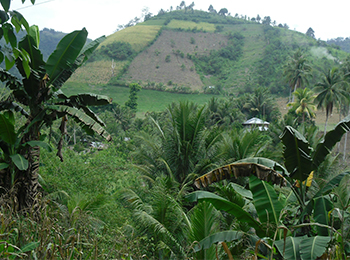About 1 result/s
-
Volume 5, Issue 1, August 2023
The Philippines is highly exposed and vulnerable to tropical cyclones (also known as typhoons), which caused over ₱352 billion worth of losses and damages to agriculture between 2000 and 2021. The study focuses on the impacts of typhoons on banana production in the Philippines. Bananas are a crucial crop for consumption, nutrition and the economy. Mindanao accounts for a majority of the country’s production. The study examines the physical sensitivity of bananas to hazards like typhoons, considering factors such as wind speed, flood-prone areas, and slope, using geographical methods.

-
Volume 4, Issue 1, April 2021
This study assessed the climate trends, changes, impacts, and adaptation strategies of farm households in five barangays in the Roxas mountain range, Koronadal City, South Cotabato by using household survey data from 265 respondents, and complimented with focus group discussions, and key informant interviews. The findings of the study revealed that climate changes are manifested by floods, landslides, and droughts as experienced by the local people which caused devastation and affected socioeconomic and environmental conditions of farming livelihood. Farmers used to have bountiful harvests, however, this situation recently changed due to the increasing climate-related risk events. The existing adaptation strategies are just stop-gap solutions that address the effects of climate change, but do not consider the root causes. To consider future changes in climate patterns, the socioeconomic and political structure and processes of the communities need to change by addressing multifaceted drivers of climate change hazards and their impacts. Some grassroot-level transformative adaptation strategies identified in the study consisted of socioeconomic facets, specifically, investment in children’s education, financial management, family planning, and development of alternative on-farm and nonfarm livelihood options. The environmental aspect, including the promotion of agroforestry system, water impoundment technologies, and advanced early warning system, were also considered.

-
Volume 4, Issue 1, January 2021
The Philippines is one of the countries
highly vulnerable to climate change, and this condition threatens further the meager
agricultural production in the country. However, while the Philippines has
established the institutional foundations linking climate change to agriculture,
through policies and legislation, advances in climate change adaptation have
been slow, especially at the local level. This paper demonstrated that this gap
in policy formulation and actual implementation stems from the lack of institutional
analysis in CCA efforts in the Philippines. The paper concludes that along with
the scientific and technological discussions, institutional conversations
should be among the initial vital steps in CCA planning, and policy and
decision-making. It further advocates that institutional analysis can be the
entry point for designing reforms toward effective CCA implementation.

-
Volume 3, Issue 1, August 2018
In 2013, Super Typhoon Haiyan, one of the strongest tropical
cyclones to impact the Philippines, made landfall in Tacloban City. The typhoon
incapacitated the city, breaking down its main lifeline, the transport system.
This article analyzes how a weakened transport system exacerbates disaster
vulnerability, specifically manifested in the restricted mobility and access of
people and communities immediately after an extreme event.
-
Volume 3, Issue 1, August 2018
Typhoon Pablo (Bopha) was the most powerful storm to have hit the island of Mindanao, southern Philippines in more than 100 years of recorded storms. This paper identified the adaptation gaps in the post-Typhoon Bopha recovery and reconstruction based on roundtable discussion, household survey and conjoint analysis.
-
Volume 3, Issue 1, February 2018
Tacloban, Philippines, the city most devastated by typhoon Haiyan in 2013, faces severe water supply constraints, particularly on the relocation sites that are expected to accommodate 40% of Tacloban's population by 2018. This study assess the impacts of climate change on the hydrological system on which Tacloban relies for water supply purposes.
-
Volume 2, Issue 2, July 2017
Vulnerability to flooding due to climate change results in limited access to resources, soil erosion and/or deposition, and reduced quality of water supply among others, affecting many farming communities. Recognizing the need to assess and better understand the adaptive capacity of farming communities, this study determined the effects of flooding and assessed the adaptive capacity levels of farming households in Mabitac, Laguna, Philippines as a case.
-
Volume 2, Issue 2, July 2017
The livelihoods of Aytas of Floridablanca, Pampanga, Philippines are dependent on natural resources, which are prone to climate change impacts. To assess their adaptive capacity, this paper analyzed the different resources available in their community using the Sustainable Livelihoods Approach Framework.
-
Volume 2, Issue 2, July 2017
In many small island developing states (SIDS), tourism is a principal driver of the economy and of infrastructure development. The SIDS’ tourism sector is, however, threatened by climate change impacts, which will likely incur high costs for climate change adaptation (CCA).
-
Volume 2, Issue 2, July 2017
The very real threat of climate change requires effective disaster risk management (DRM), especially in highly vulnerable ecosystems such as island communities. Past disaster experiences in different parts of the world have revealed the importance of integrating traditional ecological knowledge (TEK) with scientific fndings in managing disaster risk.